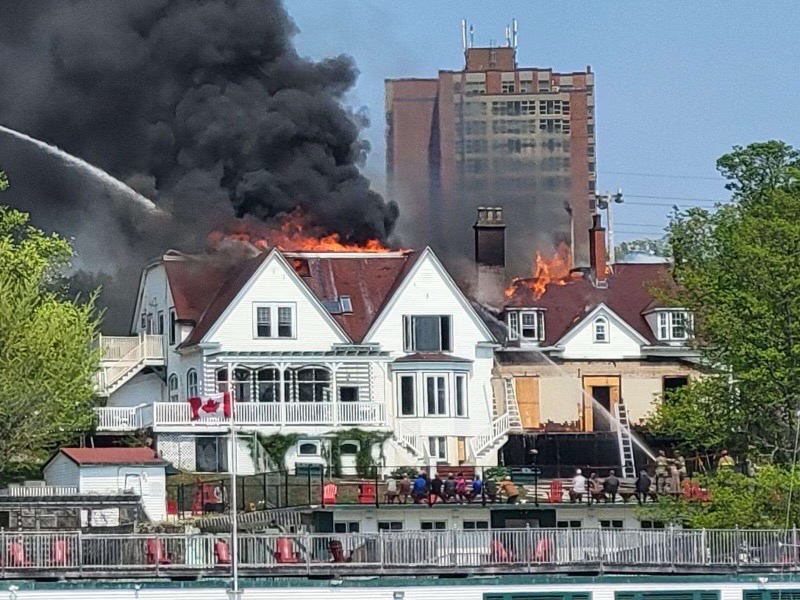Nova Scotia Premier Tim Houston says help is coming from abroad to help battle multiple wildfires that have stretched resources and have caused thousands of citizens to flee their homes.

“Eleven water bombers are hitting the Shelburne and Barrington area, six more water bombers are on the way from Montana, firefighters are on the way from the United States, firefighters are on their way from Costa Rica,” he said in an update Thursday, adding that the Canadian military has also been providing support.
Scott Tingley, manager of Forest Protection, Department of Natural Resources and Renewables, said that about 40 firefighters from the northeastern areas of the United States are expected to arrive over the weekend.
The province is also continuing to work out details to receive additional international support from firefighters in Costa Rica, he added.
“It’s still not clear whether we can get 40 or 60 (firefighters), obviously, we’re going to try to get as many as we can,” Tingley said. “That’s a unique arrangement.”
Emergency Preparedness Minister Bill Blair also announced that the federal government has approved a request to send Canadian Armed Forces members to assist Nova Scotian firefighters battling the ongoing blaze.
The update comes as hundreds of professional and local volunteers are stepping up and working tirelessly in attempts to contain the fires. As of Thursday, Houston said there were 16 fires, more than 200 homes destroyed, and almost 20,000 exhausted, scared, and evacuated Nova Scotians.
“The numbers are really breathtaking,” he said.
The premier said mental health professionals have been deployed throughout the province to support people dealing with the fear and uncertainty of the ongoing circumstances.
“None of this effort changes the fact that our province is experiencing tremendous trauma. It’s an incredibly difficult time for Nova Scotians,” Houston said.

Get daily National news
The fire in the Tantallon area, which is about a 30-minute drive from downtown Halifax, broke out on Sunday afternoon and has since grown to about 837 hectares. The fire destroyed about 200 buildings, including 150 homes, and forced the evacuation of more than 16,400 people.
A separate fire that was first reported in the Shelburne County area on Saturday — which is now regarded as one of the largest recorded wildfires in Nova Scotia history — is still out of control and amassing over 20,000 hectares, as reported Wednesday. That fire has destroyed about 50 homes and forced 5,000 people to evacuate.
On top of the already existing fires, Halifax Mayor Mike Savage announced Thursday that new fires have since popped up at the Waegwoltic Club in Halifax and another in Fall River, N.S., on Wednesday. He urged residents to follow the burn ban underway in the province.
“Believe it or not, in the last 12 hours, we’ve had somebody burning leaves with a propane torch, we’ve had somebody else that was starting a bonfire,” Savage said. “They are being investigated and fines will be levied by both the province and by the municipality.”
“This is a clear violation of the ‘no stupid policy’ if ever there is one … don’t do it. It doesn’t just affect you, it affects your neighbours and the fire personnel who are fighting these fires.”
Savage said that senior municipal staff has begun contacting evacuated homeowners to notify them if their homes have been damaged in the fire.
“It’s being handled with the utmost care and respect for those who have been devastated by this loss,” he said.
Meanwhile, the province’s chief medical officer of health, said there is “no safe level of exposure to wildfire smoke.”
Dr. Robert Strang noted that anyone exposed to wildfire smoke faces some health risks — especially small children, pregnant women, and elderly people with underlying lung or heart conditions.
“If you can see and smell smoke, then the local air quality is being negatively impacted,” Strang said, suggesting people in areas that are in proximity to wildfires should limit strenuous outdoor activity and take steps to keep indoor air as clean as possible.
“Keep your windows and doors closed as much as you can,” Strang added.
‘Extreme heat’ challenging for firefighters
On Thursday morning, Halifax Regional Fire and Emergency Deputy Chief Dave Meldrum announced that the Tantallon fire is now considered 50 per cent contained.
He mentioned the “extreme heat” conditions forecasted for the day would be challenging for firefighters. Environment Canada predicted a high of 33 C in the Halifax area.
With rain slated to begin Friday and carrying throughout the weekend, officials are hoping that Mother Nature can offer some assistance as high temperatures and low humidity continue to pose a threat to worsening conditions.
David Steeves, forestry resource technician at the Department of Natural Resources and Renewables, said at this point, any form of precipitation would be a “gift.”
Steeves noted that a brief, heavy downpour wouldn’t be enough to do the trick, as substantial progress would be determined by how the rain falls over an extended period of time.
“If you get a heavy downpour, take for instance, it doesn’t have the chance to percolate through the soil, so it will just run down into the lowest level without affecting all of the fuels,” he said.
The Department of Natural Resources and Renewables has issued a total burn ban across the province, and the province also implemented a ban on travel and activity in the woods.
Houston announced Wednesday that effective immediately, anyone who burns in the province could be subject to a fine of $25,000.
— With files from Alex Cooke









Comments